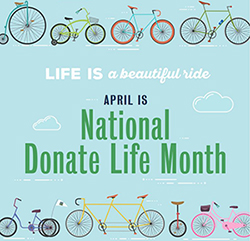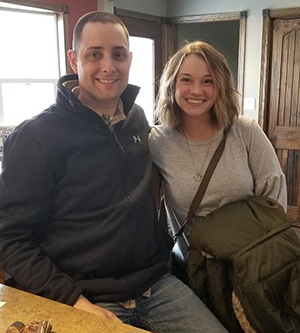The Gift of Life
April is Donate Life Month. Currently, more than 100,000 Americans are waiting for a life-saving organ transplant. And about 8,000 people die each year because organs are not donated in time.
Although 95 percent of people are in favor of being an organ donor, only 58 percent are registered. To become a donor takes less than a minute. Learn more and register now at donatelifemidwest.org/mn/
In February 2016, Cortney Steen, RN, BSN, a diabetes nurse specialist at CentraCare Health – Monticello, donated part of her liver to her friend, Eric. We recently caught up with Cortney to discuss her memories of her donation experience and how it continues to impact her yet today.
Q: How did you meet Eric and what happened that caused him to need a liver transplant?
Cortney: Eric and my husband started off as co-workers back in 2013. When our families were introduced, we knew we had met lifelong friends. It was about two years later when Eric’s autoimmune hepatitis began quickly taking his life.
When Eric had gotten really sick, he had all of his family tested to be a match and nobody was. He didn’t want to ask people to donate and he especially didn’t want to ask anyone who had a young family of their own. His wife had come to me and our group of friends and told us he was on the transplant list and things weren’t looking good. We all instantly said we would get tested and so would our spouses. At the time we had two girls ages 4 and 18 months. We knew that I would be a potential candidate because I have O-negative blood which makes me a universal donor.
 Q: How did you find out you could be a living donor?
Q: How did you find out you could be a living donor?
Cortney: When I was being considered, I went down to the Mayo Clinic the week of Christmas for lots of testing. The first day, I saw the liver specialist. He said that the chances of us being a match because of our significant size difference was little to none. He said their transplant committee reviewed Eric and my case twice and they didn’t know if they should even send me through further testing because the odds were so low.
He offered to cancel the rest of the days of testing, so I could go home early for Christmas. I decided that if there was any chance of us being a match, I wanted to see it through to the end. The next day when the surgeon came in to share the results, he was so shocked that our size would work. He said that he ran the measurements through the computer, his phone and a separate calculator because it just didn’t make sense that it would work. He said, “I can’t take any more of your liver and I can’t take any less.” It was just perfect.
Q: Did you or any of your friends or family have concerns about you donating a part of your liver?
Cortney: Many people questioned my judgment on my choice to be a living donor. Everyone was supportive but asked how I could do this having such young kids. They asked “What if something happens to her, what about her own children?” This is where I again leaned on my faith. I felt that God would not have made everything fall into place if it wasn’t meant to be. I knew it was risky, but I also knew that if Eric didn’t receive a transplant his children would be without a father. That’s how I made my choice.
Q: Three years later, how are you and Eric doing today?
Cortney: Eric is doing wonderful. The biggest risk with his surgery was that his body would reject my liver, but he did not have any issues with rejection.
I’m also doing great. With a liver transplant, the biggest risk is that the donor’s liver will not regenerate and the donor would then be facing a possible transplant themselves. But one week after the transplant, my liver had regenerated to approximately 90 percent of its original size. I have not had any medical complications as a result.
Q: How often are you reminded of your choice to be a living donor?
Cortney: I probably think about the surgery on a weekly basis, but sometimes daily. The scar is one physical reminder. My kids are fascinated by it.
I’m also reminded when I see our kids playing together. I look at my girls and his sons and I see how cute they are together. I’m reminded that all of the memories we have made together as families would never have happened if Eric’s life had ended. When I see pictures of him with his wife and sons, out living their lives, it is such a positive reminder that I made the right choice and all the risk was worth it.
Q: What is the most surprising thing that has happened to you as a result of your donation?
Cortney: Well one little surprise was that I ended up with a little surprise about nine months after the transplant. Most people don’t know this, but you can have children after donating your liver. It’s just recommended to wait one year after the transplant. We weren’t planning on our little Miss Joanna, but she was a surprise we welcomed with joy.
Q: What advice would you offer to others considering organ donation?
Cortney: I hope people will consider being a living organ donor. It isn’t the right choice for everyone, but be open to the idea. Miracles can’t happen if we aren’t willing to take chances.
Remembering Those Who Gave the Gifts of Life or Sight
St. Cloud Hospital’s “Honoring the Gift of Life” wall, located in the north hallway on the first floor of St. Cloud Hospital, honors and pays tribute to organ, tissue and/or eye donors who gave the gifts of life and/or sight at St. Cloud Hospital. It also provides education to patients, families, and visitors about the importance of donation.
